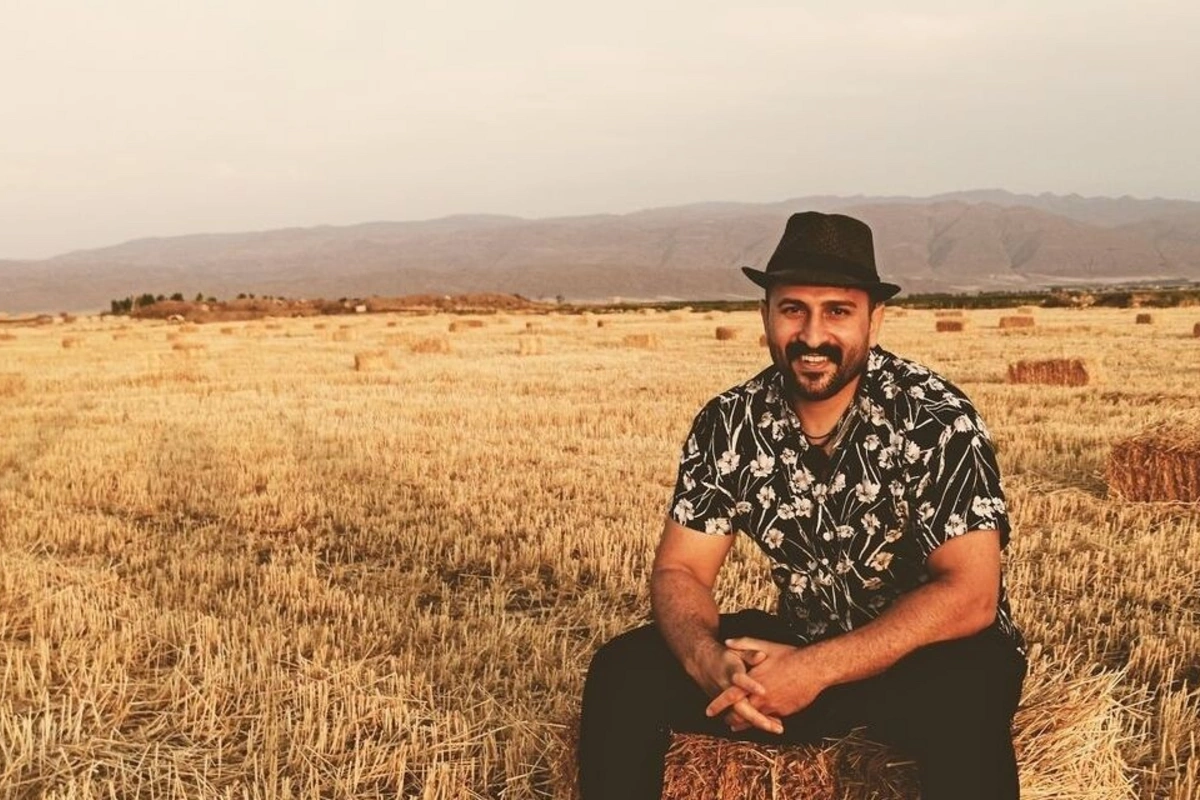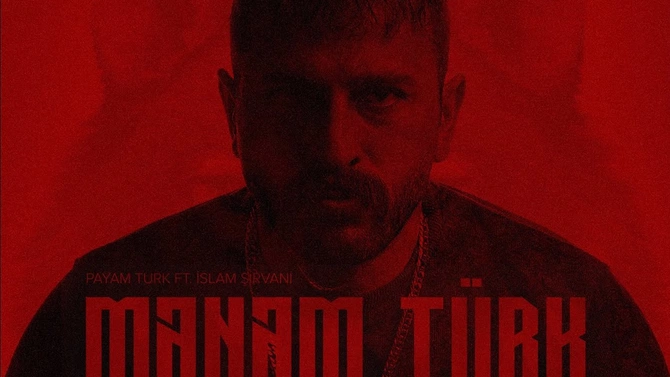
The most prominent Azerbaijani-Turkish rap artist in Iran - Payam Turk. His music has millions of views, despite rejection by authorities as "inappropriate." Is it the rap that's the problem, or his mother tongue?
Image: payamturk/Instagram
Born in 1990 in one of the villages of Bilesuvar in Ardabil province, Payam Turk is one of the most talented flag bearers of Azerbaijani-Turkish rap in Iran. He has been very active in recent years and is popular not only in Iran but also in Turkey and the Republic of Azerbaijan. So far, his songs have garnered over 17 million views on YouTube alone.
While many of his popular songs cover personal issues (“







Mənəm Türk (“

I, I am a Turk, the fear that comes to me. I speak a thousand languages, one trick every day. My strict prohibitions, I cut my tongue for years…
It’s worth noting that in Iran, to publish a song, licenses are required from the Poetry Council of the Ministry of Culture and Islamic Guidance for both the lyrics and (separately) for the music. Likewise, it is necessary to have a license to hold a concert or to film videos in public places. This is challenging enough for musicians producing ‘mainstream’ genres (traditional, folk and pop etc.), but it’s even worse for rappers. Currently, the government rejects rap altogether as an inappropriate (‘Gheyre Mojaz’) musical genre and simply doesn’t license rap artists to release albums or hold concerts. The result is that rap in Iran is essentially underground music. Nonetheless, with the growing prevalence of social media and the internet, underground artists can now easily avoid official restrictions and distribute their work online to establish their identities as artists.
So, life is tough for any rapper in Iran, but producing rap in Azerbaijani-Turkish is doubly sensitive. In music, as in film or TV, using Iran’s minoritized languages can be interpreted as challenging Farsi’s dominance as the country’s sole official language. A significant absence of institutional support in Iran for Azerbaijani-Turkish creatives means concerned community members, aware of music’s important role in preserving linguistic and cultural identities, carry the burden and responsibility of maintaining the language’s use within Iran’s artistic landscape.
By embracing rap music in Azerbaijani-Turkish, Payam Turk is at once defying official musical rules and confronting biases against his mother tongue, which some in Iran have previously stereotyped as being “not suitable” for modern, underground music.

YouTube: Payam Turk ft. İslam Şirvani — Mənəm Türk
The Caspian Post interviewed Payam Turk to learn how he managed his musical journey given such pitfalls and barriers.
When and how did you get into rap music?
Since 2004 I have been living in Ardabil city. I got into music by writing poetry. During my school years, I had a friend, a rapper now, nicknamed MZ. He drew me to rap music. He is Persian and had started singing Persian rap. He shared with me his first work. I listened to it and said I should write a Turkish version – which I did. It was my first attempt. Before that, I had never heard any rap in our language. That was in 2010.
Which rappers do you admire?
So, from the old school rappers, 50 Cent, and the new school rap, I love Pop Smoke, Tory Lanez, and Post Malone.
How does it feel to be the first and most prominent representative of Azerbaijani-Turkish rap in Iran?
It’s not good at all to feel that I am one of just a few people who have shouldered the ‘burden’ of Turkish rap in Iranian Azerbaijan. If there were more rappers, we could support each other and get our music out to a lot more people.
What influences affect your song-writing?
In rap music, people usually write from their own personal lived experiences. So far, everything I have written has been based on personal experience. But I believe that we should not limit ourselves to our experiences. It can be about things that we have not lived for ourselves. We can write songs that are based on the experiences of others. Just because you haven’t fallen in love yet, doesn’t mean that you can’t write about love.
In what ways do you think growing up in Iran shaped your musical style?
I think people in Iran grow up with a little bit of sadness inside. Maybe you do not live a good life because you struggle a lot, and this is different from growing up in comfort. You go through a lot of difficulties here. You develop yourself emotionally and mentally to cope with difficulties you’re faced with in life. All these challenges open unique perspectives. Because you must find ways to overcome those barriers and express yourself. In the end, it is a country where there are a lot of bans and restrictions.
What are your thoughts on the development and progress of rap music in Iran in general and Azerbaijani-Turkish rap music in particular?
In Iran, if we are talking about Farsi rap, I think [there are many artists who] are good with words and poetry. However, compared to international music standards, they are far behind. But if we look at Azerbaijani-Turkish rap, it’s very new. People used to laugh at us when we started singing. Some people asked, can there even be rap in our language? The emergence of social media platforms has enabled us to reach and connect with people and change their perceptions in this regard. In doing so, we challenged the stereotype that Turkish in Iran is strictly a “traditional” language that cannot be used for modern music. Now everyone knows that there is something called Turkish rap in Iran, and it is getting better with time. At the stage where we are, everything looks good, but let’s see what will happen to us in the future.
What are the challenges that you face?
There are lots. Perhaps the main challenge is the lack of music producers – for beat making, mixing, and mastering. In Iranian Azerbaijan, we do not have skilled people to do these things. As a result, I tend to work with people I haven’t met in person. They are mostly in Tehran. Slowly we are working on these issues and trying to improve them.
How do you find people's attitudes regarding rap music in Iran?
Rap music is slowly finding its place in Iran, despite all the obstacles and not being officially recognized as a “legitimate” music genre. I think people begin to see it as a genre of music like any other. However, that doesn’t mean things here will work out for rappers the way they might anywhere else in the world. For instance, we do not have the freedom to make a clip.[1] We wanted to do it once, we tried half a dozen times, but the police came and stopped us. Doing a project in such a situation can get very painful and demotivating.
Another problem is that we can’t perform concerts, so we can’t make money through this music. Dealing with these issues prevents us from working on our rap and improving it. If we had the creative freedom to do what we wanted to do, we would attract a lot more people to rap.
How did you decide to rap in Turkish? In the beginning, did you think you would be this successful?
As I said earlier, I had a Persian friend, he was singing Farsi rap, and as a Turk, I decided to rap in Turkish. It’s my mother language and the language I’m most comfortable with, so I can express my thoughts and feelings better.
I always believed in myself. That I would succeed… even more than now. If nothing hinders my work for the next two or three years, I believe that I will reach higher levels. The stage that I am at now does not satisfy me, I have big aspirations for our music. I do not say this out of arrogance, but I believe in the hard work I put in, and I hope to reap the rewards of my efforts.
What is it like to rap in Azerbaijani-Turkish in Iran?
There are many difficulties associated with it. Singing Turkish rap on its own can be perceived as ‘deviant’ when you are one of the first to do it. It can be used against you and as an excuse to label you a Pan-Turkist by some. This is very unfortunate. I hope, with the spread of our rap, we will see a change in this regard.
How did you choose the name Payam Turk?
Payam is my real name. It means ‘message’ in Persian. As for Turk, when I began to rap, for one year, I was surrounded by 20 people, all of whom were performing in Farsi. I was the only one who rapped in Turkish. Somehow, I was representing Turkish rap, so I found this nickname appropriate. Also, in Iran, we call ourselves “Turks” and our language “Turkish,” but some groups try to misrepresent us by calling us “Azeri.” In a way, by choosing this nickname, I showed my stance on this issue. I must say that, because of this choice, I face a lot of pressure and headaches - being labelled as a Pan-Turkist is one of them.
Your songs are also very popular in the Republic of Azerbaijan and Turkey. Do you plan to work or collaborate with some people there?
I am happy that my songs have a wider appeal, but I want to continue my work in Iranian Azerbaijan. Rap is the art of words, and these words come from a society and its culture. They are filled with meanings and references. Because we have grown up and lived in different countries and systems, we also have different problems and experiences. There are many things that I do not understand about [Turkish and Azerbaijani] rap and that their artists don’t understand about ours. In our society, people understand what I sing about. But I cannot say this about people over there. They understand that I sing in Azerbaijani-Turkish, but the language is not enough. Familiarity with the subject and references of the song is also important to understand the full meaning behind my words. To understand my songs, you must be familiar with Iranian society and its issues. The same is true of the raps there. Although I am into their rap myself, sometimes I do not know what they sing about. For these reasons, I think I can be more successful at my music if I stay here. Of course, I think collaborative projects are very important, and I always try to do as many as I can.
[1] It is not possible to get the necessary permits that are required to film video footage in public.
Share on social media